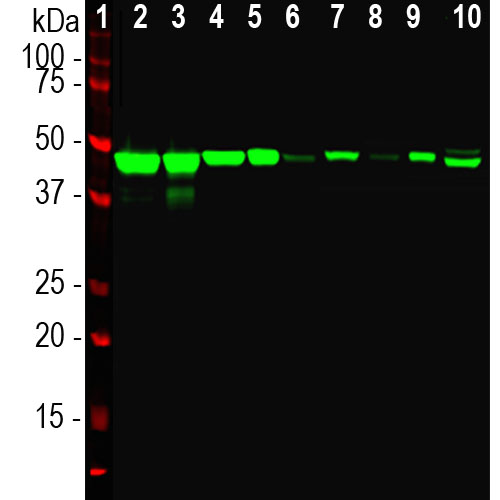| Name: | Rabbit polyclonal antibody to NSE |
| Immunogen: | Recombinant full length human NSE expressed in and purified from E. coli |
| HGNC Name: | ENO2 |
| UniProt: | P09104 |
| Molecular Weight: | 47kDa |
| Host: | Rabbit |
| Isotype: | |
| Species Cross-Reactivity: | Human, Rat, Mouse |
| RRID: | AB_2277965 |
| Format: | Antibody is supplied as an aliquot of serum plus 5mM NaN3 |
| Applications: | WB, IF/ICC, IHC |
| Recommended Dilutions: | WB: 1:2,000. IF/ICC: 1:500. |
| Storage: | Store at 4°C. For longer term storage, leave freeze at -20°C. Minimize freeze/thaw cycles. |

Immunofluorescent analysis of mixed cortical neuron-glial cell culture from E20 rat stained with rabbit pAb to neuron specific enolase (NSE), RPCA-NSE, dilution 1:500 in red, and costained with chicken pAb to GFAP, CPCA-GFAP, dilution 1:5,000 in green. The blue is Hoechst staining of nuclear DNA. the NSE antibody labels protein expressed in neuronal cells, while the GFAP antibody stains intermediate filaments in astrocytic and certain other glial cells.

Western blot analysis of different tissue and cell lysates using rabbit pAb to neuron specific enolase (NSE), RPCA-NSE, dilution 1:5,000 in green: [1] protein standard (red), [2] rat brain, [3] rat spinal cord, [4] mouse brain, [5] mouse spinal cord, [6] NIH-3T3, [7] HEK293, [8] HeLa, [9] SH-SY5Y, and [10] C6 cells. A single band at about 47kDa corresponds to the NSE protein, seen only in extracts containing neurons ro neuronal lineage cells.
Rabbit Polyclonal Antibody to NSE
Cat# RPCA-NSE
$120.00 – $800.00
Neuron specific enolase (NSE) is an enzyme which catalyzes the conversion of 2-phosphoglycerate to phosphoenolpyruvate in the glycolytic pathway, and also the reverse reaction in gluconeogenesis. It is one of three mammalian enolases, which are also known as ENO1, ENO2, and ENO3 or alternately as α, β and γ enolase. The three enolases are related in protein sequence (see here), and have different cell type specific expression patterns, so that antibodies to them are useful cell type specific markers. NSE is also known as enolas 2 or γ enolase and is heavily expressed in neuronal cells. Enolase 1 is also known as α enolase and as non-neuronal enolase. The third enolase, enolase 3 or β enolase, is expressed in muscle cells. Perhaps not surprisingly, since neurons require a great deal of energy, they are very rich in glycolytic enzymes such a GAPDH and NSE. Antibodies to this protein are therefore useful to identify neuronal cell bodies, and also developing neuronal lineage and neuroendocrine cells. Release of NSE from damaged neurons into CSF and blood has also been used as a biomarker of neuronal injury, and elevated NSE levels in blood and tissues are seen associated with various kinds of neuroendocrine derived tumors (1,2).
The RPCA-NSE antibody was made against full length recombinant human NSE expressed in and purified from E. coli. It can be used to trace NSE and to identify neuronal cells in cell culture and sectioned material. We also supply an alternate polyclonal antibody to NSE made in chicken, CPCA-NSE. Mouse select image at left for larger view.
Chromogenic immunostaining of a formalin fixed paraffin embedded mouse hippocampus section with rabbit pAb to neuron specific enolase, RPCA-NSE, dilution 1:1,000, detected with DAB (brown) using the Vector Labs ImmPRESS method and reagents with citra buffer retrieval. The RPCA-NSE antibody labels the cytoplasm of most neurons (but not Purkinje cells). This antibody performs well in testing with both 4% PFA and standard NBF fixed rat, mouse, and human tissues. Mouse select image for larger view.
Human embryonic kidney 293 (HEK293 cells) are a widely used cell line in research and manufacturing. Perhaps surprisingly given their origin in kidney cell cultures they express many proteins which are normally only seen in neuronal lineage cells (3). The red channel in the image above shows staining with RPCA-NSE antibody to neuron specific enolase which recognizes all of these cells. The green channel shows staining for another neuronal marker, the EnCor monoclonal antibody to ubiquitin C-terminal hydrolase 1 (UCHL1), MCA-BH7. This is also a protein normally found only in neuronal lineage cells and is apparently expressed in a cell density dependent fashion in HEK293 cells at this stage as only a few cells express this protein. However, all cells expressing NSE also express UCHL1, consistent with the proposed neuronal lineage origin of HEK292 cells. Mouse select image for larger view of the image.
A sequence alignment of the 3 human enolase molecules can be downloaded from here.
1. Begaz T, Kyriacou DN, Segal J, Bazarian JJ. Serum biochemical markers for post-concussion syndrome in patients with mild traumatic brain injury. J. Neurotrauma 23:1201-10 (2006).
2. Isgrò MA, Bottoni P, Scatena R. Neuron-Specific Enolase as a Biomarker: Biochemical and Clinical Aspects. Adv. Exp. Med. Biol. 867:125-43 (2015).
3. Shaw G, et al. Preferential transformation of human neuronal cells by human adenoviruses and the origin of HEK 293 cells. FASEB J. 16:869-71 (2002).
Related products
-

Rabbit Polyclonal Antibody to Fibrillarin
$120.00 – $800.00
Cat# RPCA-FibSelect options This product has multiple variants. The options may be chosen on the product page -

Rabbit Polyclonal Antibody to IBA1
$120.00 – $800.00
RPCA-IBA1Select options This product has multiple variants. The options may be chosen on the product page -

Rabbit Polyclonal Antibody to Adenylate Cyclase III
$150.00 – $1,000.00
Cat# RPCA-ACIIISelect options This product has multiple variants. The options may be chosen on the product page -

Rabbit Polyclonal Antibody to MARCKS
$150.00 – $1,000.00
Cat# RPCA-MARCKSSelect options This product has multiple variants. The options may be chosen on the product page
Contact info
EnCor Biotechnology Inc.
4949 SW 41st Boulevard, Ste 40
Gainesville
Florida 32608 USA
Phone: (352) 372 7022
Fax: (352) 372 7066
E-mail: admin@encorbio.com



